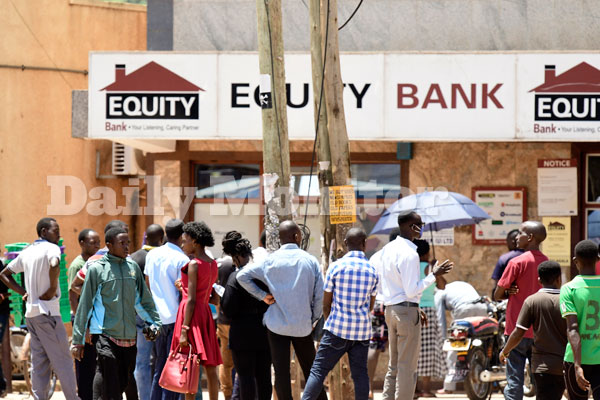African states fret over dirty money, urge linked solutions
Sunday September 01 2024
A National Risk Assessment conducted in Kenya identified fraud, forgery and drug trafficking as significant threats. PHOTO | SHUTTERSTOCK
African countries are seeing money laundering as a common problem requiring transboundary solutions, in what call for linked legal frameworks to tackle the issue.
At the 48th Eastern and Southern Africa Anti-Money Laundering Group (ESAAMLG) Task Force of Senior Officials Conference this week, officials summed up money laundering as a fuel for other organised crime transcending physical boundaries. These include terrorism, drug trafficking, human trafficking and poaching.
Essentially, money laundering is concealing financial benefits obtained from these illegal activities but also includes corruption or embezzlement of public funds. Launderers often try to convert the money into some legitimate business, say a night club, land buying and selling and other businesses to hide their tracks.
Kenya’s National Treasury Principal Secretary Chris Kiptoo admitted the increasing activity by groups in the eastern and southern Africa regions means laundering in one part of the continent can directly hurt the other. But he also argued that these regions need special solutions suitable to them, rather than blanket moves that may have worked elsewhere.
Read: Construction is Kenya’s top money laundering sector
“The risk must be contextualised and mitigated from a regional perspective as, a threat to one country is surely a threat to other regional members. This calls for greater cooperation and coordination of efforts by the members,” said Dr Kiptoo in Diani, Kenya, during the conference.
Money laundering forms the wider problem of illicit financial flows. According to the 2023 Tax Transparency in Africa Progress Report, African countries have saved up to $2 billion per year from voluntary disclosures, improved information exchange sharing and rigorous offshore investigations.
The report was released by the Global Forum on Transparency and Exchange of Information for Tax Purposes, the African Union Commission and the African Tax Administration Forum, supported by the African Development Bank, and observed trends in 38 African countries where tax evasion, and other illicit financial flows have been higher.
Overall, Africa loses some $60 billion to these illicit flows. But when it comes to laundering, which may be illicit financial transactions within the same country, or across the border, countries have struggled to tame the vice.
Dr Kiptoo said agencies and private organisations need to continue addressing new and emerging risks as criminals have found diverse methods to outwit measures put in place to combat money laundering and terrorist financing.
“The challenges posed by virtual assets and new payment methods will also need to be addressed. Members need to move at the same pace so as to address new and emerging issues in a holistic manner,” he said, referring to the digital representations of value that can be traded or used as payment such as cryptocurrency.
Kenya and other countries such as Namibia, for instance, though they had improved their watch over financial dealings, are still grey-listed among 12 African nations on a list of 21 overall.
“We need to re-examine the listing criteria and processes and fine-tune the same taking into account the challenges faced by low-capacity countries lest the process becomes counterproductive. The listing criteria should strengthen the national anti-money laundering (AML) and counter-terrorist financing (CFT) regimes for under resourced countries,” said the PS.
Read: Will stablecoins overcome criminals’ interest?
When categorised in the grey-list, the market tends to respond negatively to countries with some countries and regulators including the European Union and the United Kingdom also compel their institutions to treat the businesses and persons linked to grey-listed countries as higher risk customers and parties.
More than 60 percent in the Eastern and South African countries are yet to address the identified strategic deficiencies to combat money laundering and terrorist financing which is affecting confidence of investors in Africa.
In February this year, Kenya and Namibia were grey-listed an indictment on a country’s ability to identify and effectively remediate AML/CFT risks which sends a message to the global financial system to exercise caution in dealings with the country.
A National Risk Assessment conducted in Kenya identified fraud, forgery and drug trafficking as significant threats. However, recovery from these crimes has been relatively low compared to recoveries from misuse of resources and corruption.
Saitoti Maika, the Director General of the Financial Reporting Centre, and of the Task Force of Senior Officials the Eastern and Southern Africa, said statistics on compliance with the FATF recommendations have been mixed, with some wins and losses.
“This mixed bag of reality can be discerned from the outcome of the just concluded 2nd Round of Mutual Evaluations where several ESAAMLG Member jurisdictions remain in the “enhanced follow-up” process, with six (6) of them being under active monitoring,” said Mr Maika.
During the one-week meeting, the Task Force meeting will discuss follow-up reports on trends in each of the countries in eastern and southern Africa region. They include Kenya, Madagascar, Mozambique, Tanzania, Uganda and Zambia which have requested to be re-rated.
Lesotho, Malawi, Mauritius, Namibia, Seychelles and Zimbabwe are also participants to be reviewed.
